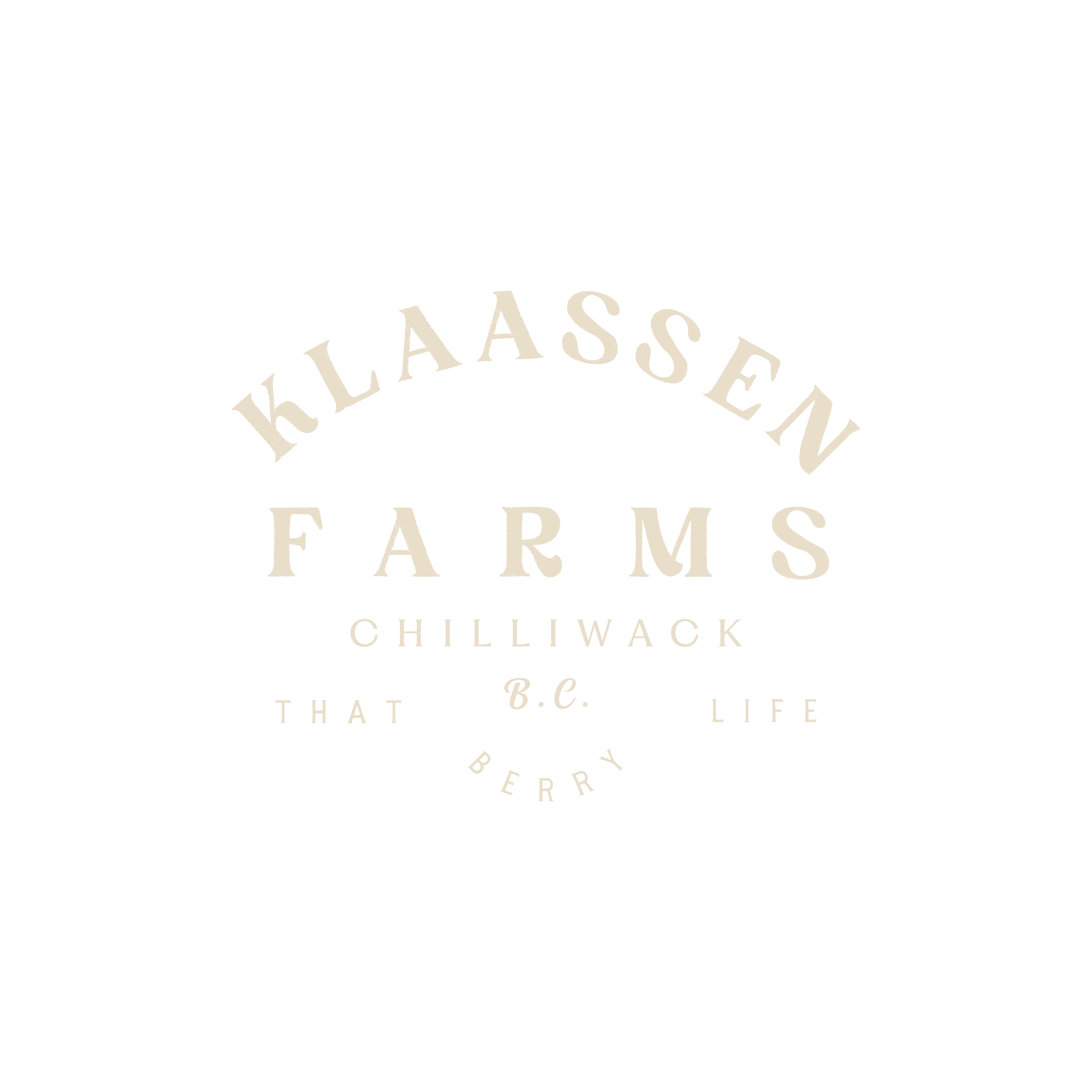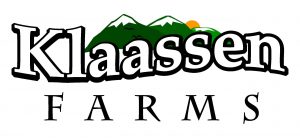
PANDEMIC PREPAREDNESS PLAN
Klaassen Farms Ltd.
51211 Chilliwack Central Rd, Chilliwack, BC V0X 1X2 Jake Klaassen / 604-702-5699 (Owner)
Chris Colley / 604-997-5151 (Safety Manager)
PURPOSE OF STATEMENT
Klaassen Farms Ltd. is committed to providing a safe and healthy workplace for all our staff. A combination of measures will be used to minimize worker exposure to all possible pandemic outbreaks and COVID-19, including the most effective control technologies available. Our work procedures will protect not only our workers, but also other workers who enter our facilities. All employees must follow the procedures outlined in this plan to prevent or reduce exposure to all possible pandemic outbreaks and COVID-19.
HEALTH HAZARDS OF COVID-19
A global pandemic and a public health emergency in British Columbia. COVID-19 is a virus that can cause respiratory illness and can lead to hospitalization and death. The effects of all possible pandemic outbreaks and especially COVID-19 is expected to be much more severe than for seasonal influenza because most people will not have any immunity to the virus. Seniors and people with underlying health issues (including heart disease, diabetes, and lung disease) are at a higher risk of hospitalization and death, but young and healthy people are also at risk.
NOTIFICATION CALLING TREE
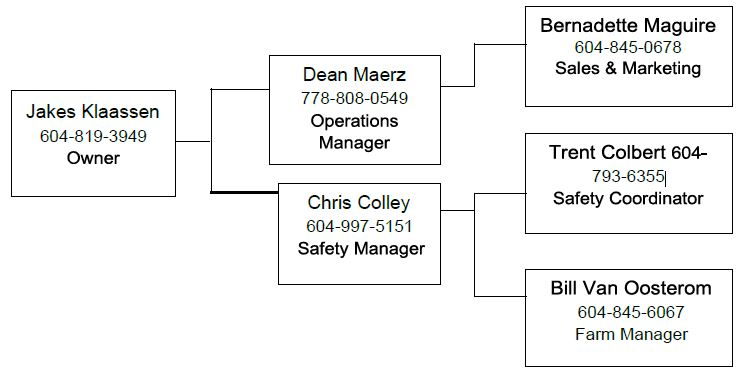
SYMPTOMS:
Symptoms of all possible pandemic outbreaks and including the current COVID-19 are likely to include fever, cough, sneezing, sore throat, and difficulty breathing.
TRANSMISSIONS:
Exposure to all possible pandemic outbreaks and including the current COVID-19 can occur by:
• Breathing in droplets in the air that are generated when people cough or sneeze.
• Close contact with other people (e.g. shaking hands or hugging).
• Touching contaminated surfaces and then touching the face, mouth, or food.
Note that touching a contaminated surface and then touching another surface may cause the viruses to transfer from one surface to another. All possible pandemic outbreaks and including the current COVID- 19 can be transmitted even by people who are not displaying symptoms of the disease. People who may be infected with any possible pandemic outbreaks and including the current COVID-19 should not come to work.
This includes people who:
• Have symptoms of COVID-19.
• Have traveled outside of Canada with then previous 14 days.
• Have been exposed to someone with COVID-19.
• Share a home with someone who has symptoms of COVID-19.
• Share a home with someone who has been exposed to COVID-19.
SICK LEAVE ARRANGEMENTS:
• If you are experiencing symptoms that are commonly associated with any possible pandemic outbreaks and including the current COVID-19 and Qualify for a test as approved by Health officials, request sick leave or work from home.
• If you have a positive pandemic or COVID-19 diagnosis, you can return to the office only after you have fully recovered, with a doctor’s note confirming your recovery.
• If you have recently returned from areas with a high number of pandemic outbreaks or COVID-19 case (based on CDC announcements), we’ll ask you to stay home for 14 calendar days, and return to work only if you are fully asymptomatic. You will also be asked not to come into physical contact with any colleagues during this time.
• If you’ve been in close contact with someone infected by a pandemic outbreak or COVID- 19, with high chances of being infected yourself, you will also be asked not to come into physical contact with any colleagues during this time.
CONTINUATION OF OPERATIONS IF A LARGE PERCENTAGE OF PERSONNEL BECOME Ill:
In the event there is a High percentage of personnel that become ill or unable to work Klaassen Farms Ltd. will consider the following as precautionary mitigating measures:
• Continue to work with reduced number of workers if it is safe to do so.
• Replace workers from other departments or crews.
• Ensure strict screening and if warranted hire new workers to replace the workers that are affected from a pandemic outbreak situation or (COVID-19).
• Train current workers that are healthy for the positions and job descriptions that need replacing due to the pandemic outbreak situation or (COVID-19).
• Klaassen Farms Ltd. Management will assess each situation case by case depending on the underlying conditions of the sick employee.
EMPLOYEE IMMUNIZATION ENCOURAGEMENT:
Klaassen Farms Ltd. will suggest and encourage our staff to obtain the appropriate immunization and to follow the recommendations of the BC Health Ministry Guidelines in order to ensure our employees take the best measures possible to ensure their personal health and fight of viruses and infectious disease of a pandemic outbreak including (COVID-19)(when there is a vaccine developed).
TRAVELING/VISITS/MEETINGS/COMMUTING MEASURES:
• All work/personal trips and events – both domestic and international – should be cancelled/postponed until further notice.
• In-person meetings should be done virtually where possible, especially with non-company parties (e.g. candidate interviews and partners).
• All office visitors/sales are postponed at this time unless authorized by appointment only.
• Refrain attending any or all groups or functions/meetings where there maybe 10 or more individuals.
RESPONSIBILITIES:
EMPLOYER RESPONSIBILITY:
Our company will:
• Ensure that the materials (for example, gloves, alcohol-based hand rubs, and washing facilities) and other resources (for example, worker training materials) required to implement and maintain the plan are readily available where and when they are required.
• Ensure that workers are always able to maintain social distancing (2 meters apart) while completing their work safely.
• Select, implement, and document the appropriate site-specific control measures.
• Ensure that supervisors and workers are educated and trained to an acceptable level of competency.
• Ensure that workers use appropriate personal protective equipment (PPE) — for example, gloves, gowns, eye protection, and respirators.
• Conduct a periodic review of the plan’s effectiveness. This includes a review of the available control technologies to ensure that these are selected and used when practical.
• Maintain records of training and inspections.
• Ensure that a copy of the exposure control plan is available to workers.
SUPERVISOR RESPONSIBILITY:
Our Supervisors Will:
• Ensure that workers are adequately instructed on the controls for the hazards at the location.
• Ensure that workers use proper respirators, they have been fit tested, and the results are recorded.
• Ensure that social distancing is maintained.
• Direct work in a manner that eliminates or minimizes the risk to workers.
WORKER RESPONSIBILITY:
Our Workers Will:
• Maintain social distance
• Know the hazards of workplace.
• Follow established work procedures as directed by the employer or supervisor.
• Use any required PPE as instructed.
• Report any unsafe conditions or acts to the supervisor.
• Know how and when to report exposure incidents.
RISK IDENTIFICATION AND ASSESSMENT
Three primary routes of transmission are anticipated for all possible pandemic outbreaks and including the current COVID-19, all of which need to be controlled. These include contact, droplet, and airborne transmission.
BREATHING IN DROPLETS IN THE AIR:
BCCDC advises that coronavirus is not transmitted through airborne transmission, however, if somebody coughs or sneezes they do generate droplets which are airborne for at least a short period of time but do not float in the air and generally fall to the ground within one to two meters. Anybody who is near the individual may risk breathing in these droplets. Social distancing (maintaining 2 meters of distance from other people at all time) will reduce the risk
of this occurring.
CLOSE CONTACT:
Close contact refers to physical contact with another person, for example shaking hands or hugging. When people cough or sneeze droplets may deposit on their skin or clothing, especially if they cough or sneeze into their hands. People who are carriers of possible pandemic viruses including COVID-19 may transfer the viruses from their hands or clothing to others during close contact.
SURFACE CONTACT:
Surfaces can become contaminated when droplets carrying any possible pandemic outbreaks and including the current COVID-19 deposit on them, or when they are touched by a person who is infected. Surface contact involves a worker touching a contaminated object such as a table, doorknob, telephone, or computer keyboard or tool, and then touching the eyes, nose, or mouth. Surface contact is important to consider because any possible pandemic outbreaks and including the current COVID-19 can persist for several days on surfaces.
The following risk assessment table is adapted from Regulation Guideline G6.34-6. Using this guideline as a reference, we have determined that the risk level of our workers is low when they maintain social distancing. Our workers work on a construction work site and have little contact with the public.
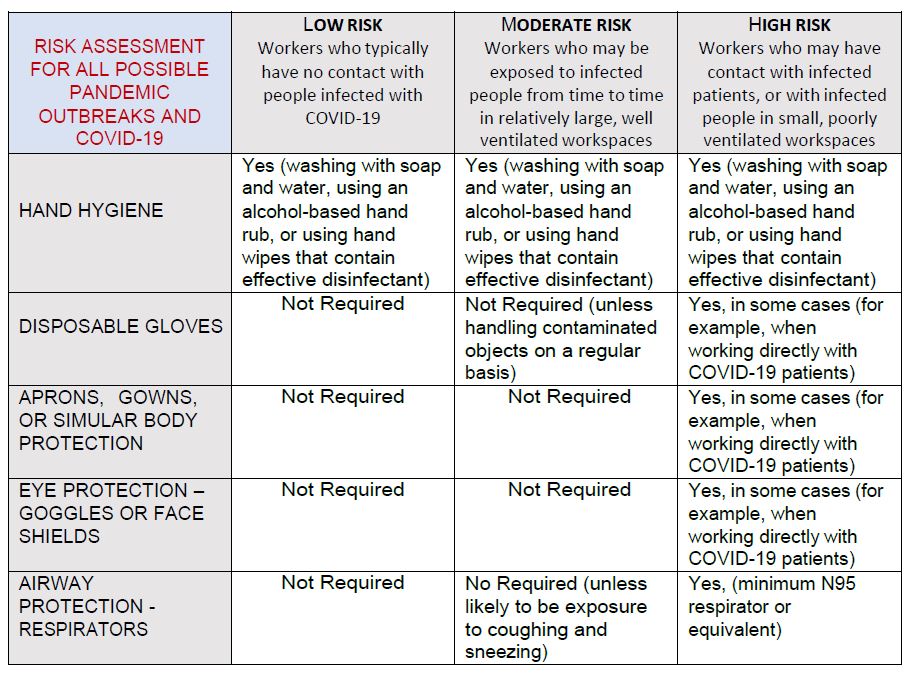
RISK CONTROL:
The Regulation requires employers to implement infectious disease controls in the following order of preference:
1. Engineering controls.
2. Administrative controls.
3. Personal protective equipment (PPE).
It is not necessary to implement engineering controls in our workplace because the risk of exposure can be controlled using administrative controls (for example, social distancing, hand washing, surface cleaning and cough sneeze etiquette) and PPE (respirators).
HAND WASHING:
Hand washing is one of the best ways to minimize the risk of infection. Proper hand washing helps prevent the transfer of infectious material from the hands to other parts of the body—particularly the eyes, nose, and mouth or to other surfaces that are touched.
Wash your hands immediately:
• Before leaving a work area.
• After handling materials that may be contaminated.
• Before eating, drinking, smoking, handling contact lenses, or applying makeup.
HAND WASHING PROCEDURE:
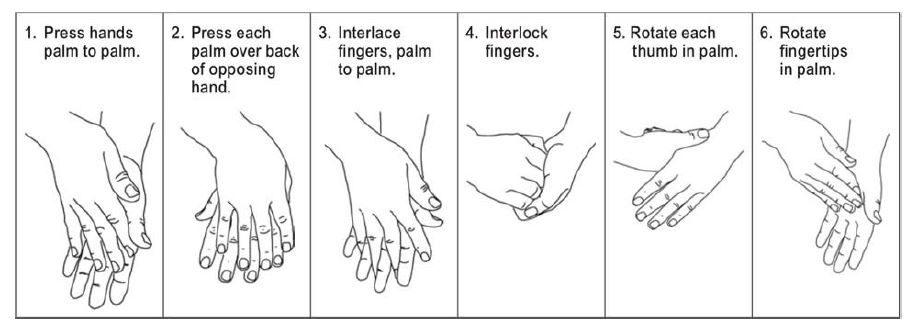
Use soap and warm water. (It does not have to be hot to do the job.) If water is unavailable, use a waterless hand cleanser that has at least 70% alcohol. Follow the manufacturer’s instructions on how to use the cleanser. Alcohol-based hand rub dispensers are located adjacent to the washrooms and kitchen area.
COUGH/SNEEZE/ ETIQUETTE:
Our workers are expected to follow cough/sneeze etiquette, which is a combination of measures that minimizes the transmission of diseases via droplet or airborne routes.
Cough/sneeze etiquette includes the following components:
• Educate workers in control measures, including hand washing.
• Post signs at entry points to instruct everyone about control measures.
• Cover your mouth and nose with a sleeve or tissue when coughing or sneezing.
• Use tissues to contain secretions and dispose of them promptly in a waste container.
• Offer surgical masks to people who are coughing.
• Turn your head away from others when coughing or sneezing.
• Wash hands regularly.
IF WORKER SHOWS SYMPTOMS OF ANY POSSIBLE PANDEMIC OUTBREAK INCLUDING (COVID-19)
If workers are ill with a possible pandemic outbreak and including COVID-19, they should stay home. If they develop symptoms of a possible pandemic outbreak and including COVID-19 while at work, they should leave the workplace. Workers should only return to the workplace once they have recovered from the infectious disease including COVID-19. Workers should inform their manager or supervisor if they are ill with any infectious disease including COVID-19.
Workers who suspect they may have COVID-19 should use the BC Self-Assessment Tool: https://covid19.thrive.health or call 811 for assistance.
WORKER TRAINING
Our workers will receive training in the following:
• The risk of exposure to an infectious disease including COVID-19, and the signs and symptoms of the disease.
• Safe work procedures to be followed, including hand washing, social distancing, and cough/sneeze etiquette.
• Location of washing facilities, including dispensing stations for alcohol-based hand rubs.
• How to seek first aid.
• How to report an exposure to or symptoms of an infectious disease including COVID-19.
INTERNAL COMMUNICATION:
Internal communication within the organization must be completed as below:
• No physical forms of communication. (do not share pens, do not touch one another, and maintain 2 meters from co-worker).
• If meeting need to take place ensure in a well-ventilated area, limit the meeting to groups no larger than 5 people. Always maintain 2-meters distance. Clean tables and chairs. If practicable hold meeting outdoors.
EXTERNAL COMMUNICATION:
External communication within the organization must be completed as below:
• No physical forms of communication. (do not share pens, do not touch one another, and maintain 2 meters).
• Anyone coming to the head office must call a head and be approved, prior to entering the premises.
• Emails and phone calls are the desired method of communicating.
•If meeting need to take place ensure in a well-ventilated area, limit the meeting to groups no larger than 5 people. Always maintain 2-meters distance. Clean tables and chairs. If practicable hold meeting outdoors.
BEST PRACTICES:
As an added measure to limit the potential exposure of this virus to workers on site, Klaassen Farms Ltd. is requiring Klaassen Farms Ltd. and all subcontractors / suppliers undertake the following job site.
• Gather and clean all known hand and power tools shared among workers on site. This includes containers or facilities used to store such items. Use an approved disinfectant and do this daily.
• Clean all offices, lunchrooms and bathrooms using an approved disinfectant. This must be done daily. Be certain this includes handles, doorknob, fridge, microwave, toaster, coffee machine, etc. Increase cleaning intervals as needed to ensure such areas remain clean and disinfected.
• Implementation of a 100% glove use policy. Klaassen Farms Ltd. is enforcing the use of gloves full time by all workers on Klaassen Farms Ltd. job sites to assist in preventing the spread of the virus. We recognize that job site workers may sharing company supplied tools, therefore we see it important to implement the use of gloves by all workers on site. All subcontractors to ensure all workers have access to proper gloves at the job site level.
• Upon use of office items that are shared among staff, use an approved disinfectant, and disinfect after use.
HEALTH MONITORING
• Our workers will promptly report any symptoms of an infectious disease including COVID- 19 to their manager or supervisor and the first aid attendant.
Please Read Carefully:
Service Canada is ready to support Canadians affected by an infectious disease including COVID-19 and placed in quarantine, with the following support actions:
• The one-week waiting period for EI sickness benefits will be waived for new claimants who are quarantined so they can be paid for the first week of their claim
• Establishing a new dedicated toll-free phone number to support inquiries related to waiving the EI sickness benefits waiting period
• Priority EI application processing for EI sickness claims for clients under quarantine
• People claiming EI sickness benefits due to quarantine will not have to provide a medical certificate
• People who cannot complete their claim for EI sickness benefits due to quarantine may apply later and have their EI claim backdated to cover the period of delay
Contact the new dedicated toll-free phone number if you are in quarantine and seeking to waive the one-week EI sickness benefits waiting period so you can be paid for the first week of your claim:
• Telephone: 1-833-381-2725 (toll-free)
• Teletypewriter (TTY): 1-800-529-3742
RECORD KEEPING
• Klaassen Farms Ltd. will keep records of instruction and training provided to workers regarding COVID-19, as well as exposure reports and first aid records.
IMPLEMENTING LESSONS LEARNED FOLLOWING A PANDEMIC
• After the pandemic Klaassen Farms Ltd. OH&S Representatives will conduct an in-depth evaluation of the pandemic response and recovery at all levels.
• Develop recommendations for improvement and integrate into pandemic preparedness and business continuity plans and train all employees on all finding and changes that have been learned following the pandemic.
• Set key indicators and establish systems to assess pandemic preparedness and teach to all employees.
• Set timelines (e.g. daily or weekly) for and conduct regular reviews of ongoing pandemic preparedness, response, and recovery activities in preparedness for future pandemic outbreaks.
• Klaassen Farms Ltd. will establish mechanisms to implement recommendations for improvement immediately after the pandemic has been cleared.
• Establish mechanisms to continuously review the effectiveness of pandemic response actions and modify, if needed and teach findings to all Klaassen Farms Ltd. employees.
ANNUAL REVIEW
• Klaassen Farms Ltd. will review the exposure control plan every year and update it as necessary, in consultation with our joint health and safety committee or worker health and safety representative.
• Note: Klaassen Farms Ltd. will review and test this Pandemic Outbreak Plan including (COVID-19), as recommended and as per subject to changes and recommendation put forward by BC Heath Ministries Guidelines.
